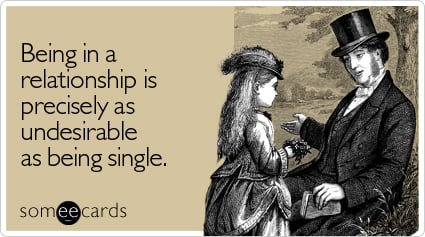I don't know if it's because of spring, but I've been thinking about love a lot lately. It's such a powerful, irrational, crazy, awesome, terrible, magnificent emotion. It can render you senseless; you become silly and happy and sad and giddy and depressed all at the same time due to the same emotion. I've had my fair share of experiences when it comes to love and it's been beautifully horrible and horribly beautiful. Regardless of the people I've been in love with, one thing I have definitively walked away with is the knowledge that love does not conquer all.
I'm sorry, did I just burst your bubble? My bad.
Despite the statement above, I'm actually not (too) jaded. I believe love is the foundation upon which a relationship is built, but it is not enough to overcome the obstacles that we often face in our relationships. The people involved have to be committed to not only doing the work but also doing the love. Often, we get caught up in the emotion and forget that love is also a verb. While you may feel love for someone, are you doing love to them? (Doing love is not just about sex, by the way.)
We all have a different understanding of what love means, how it feels and what it looks like. Regardless, loving someone means loving them in the way they understand it, not only in the way we do it. It also means compromising...a lot. Even if we don't understand why they need whatever, we do it anyway because it means something to them. Yet, it seems like this is a fundamental problem within many relationships. Is it because we're selfish? Stupid? Lazy? Confused?
Yep. All of the above.
Our idea of normal is shaped by what we've experienced throughout our lives. If you grew up in a family that was affectionate, you're more likely to be affectionate. If you grew up in a family where emotional expression was not encouraged, you're less likely to be emotionally expressive. It can be difficult to comprehend someone else's normal when it is counter to our own. However, when we do love to someone, we work our hardest to get over our confused, selfish, lazy stupidity and do it to them in the way they understand. Hopefully, it will be reciprocated. Sometimes though, it can't. What we understand as “normal” love may be so counterintuitive to our partner, that they just can't do it. Their history, their baggage, may be the biggest obstacle to them doing love, even though they feel the emotion. There's also the possibility that their way of understanding love may be unhealthy; ever dated someone who thought that fighting and screaming at one another equals love?
Although I'm mostly talking about romantic love, it also applies to familial love. Our family members have their own baggage that prevents them being loving, despite the desire they may have. If we aren't emotionally expressive, it's most like due to the fact that it wasn't role modeled by our parents. It can be extremely difficult to change those relationships and sometimes we have to accept them as they are. Your mom is always going to be your mom; we can't control how they are going to be but we can control how we react to them. Once we stop looking for something they can't give, it's much easier to be in a relationship with them. Or we can decide that we no longer want to have a relationship with them, particularly if relationship is toxic. Your mom may always be your mom, but she doesn't have to be a part of your life once you become an adult.
Even though I no longer believe that love can conquer all, I do believe in its power and necessity for humanity to survive. Love is a helluva drug. Be careful who you give it to and who you get it from; you never know how it will affect you.
Have you ever loved someone but couldn't be with them? Is it better to have loved and lost than never to have loved at all? Have you ever done something crazy because of love? How is doing love and feeling love different for you?





